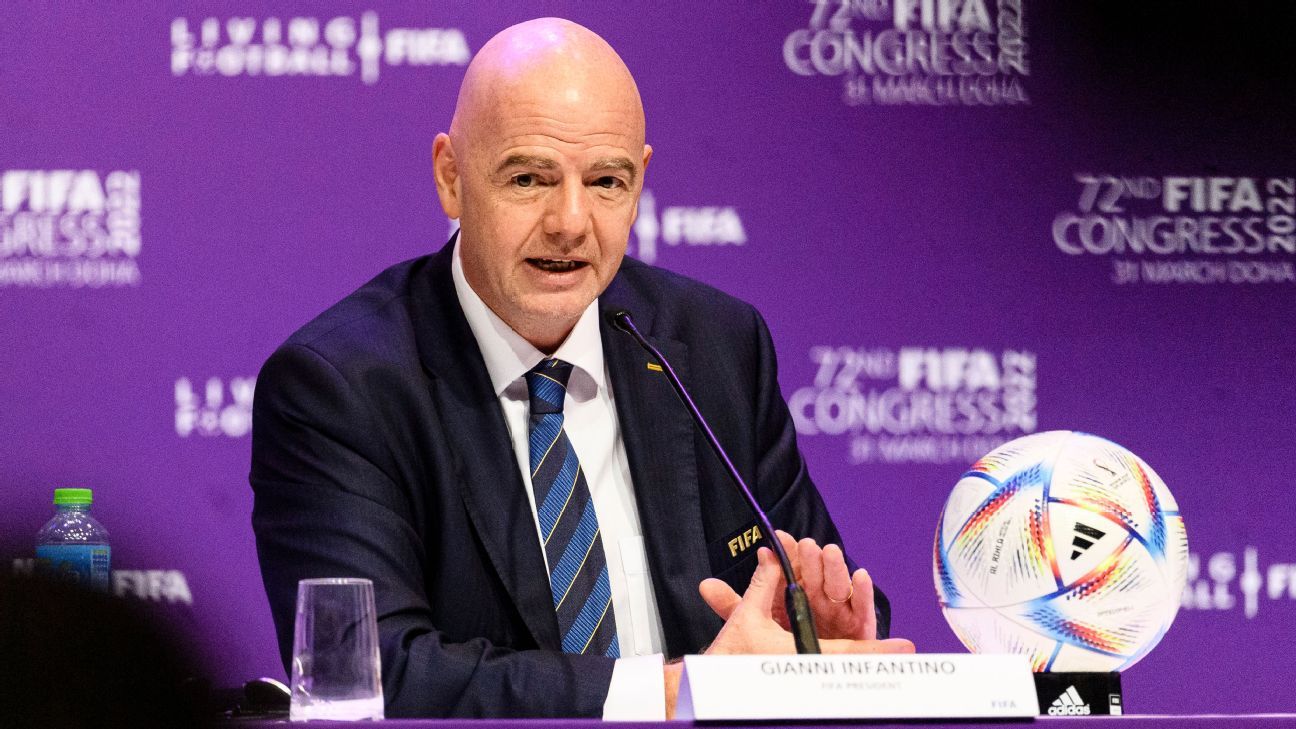FIFA president Gianni Infantino has rejected claims that the organisation pushed for a biennial World Cup.
Speaking at the 72nd FIFA Congress in Doha, Infantino said FIFA had merely explored the possibility of halving the four-year World Cup cycle despite Chief of Global Football Development and former Arsenal manager Arsene Wenger conducting a series of interviews in support of the idea.
– ESPN+ viewers’ guide: LaLiga, Bundesliga, MLS, FA Cup, more
– Don’t have ESPN? Get instant access
It was originally hoped that Congress would vote to advance the prospect of a World Cup every two years this week after Infantino advocated the proposal at a virtual global summit last December.
A subsequent feasibility study suggested FIFA could pass on an additional $19million every four years for each member nation should a biennial World Cup come to pass but the idea was met with opposition from a number of countries.
And Infantino said in his speech on Thursday: “Let me be very clear that FIFA has not proposed a biennial World Cup. Let’s get the process clear. The last FIFA Congress asked the FIFA administration with a vote, which 88% voted in favour, to study the feasibility of a World Cup every two years and some other projects.
“Now the FIFA administration, under the leadership of Arsene Wenger, did exactly that: studied the feasibility. FIFA did not propose anything.
“FIFA came to the conclusion that it is feasible, that it would have some repercussions and impacts but once this was certified, the next phase starts and it is a phase of consultation, discussion, trying to find agreements and compromise. In addition to the confederations and the associations, we have the leagues, the clubs and the players present here as well.
“We work together, we try and will try to have a debate and a discussion to find what is most suitable to everyone because everyone has to benefit. The big ones have to become bigger and the small ones have to benefit as well. We have to give opportunities to everyone. And I am thanking everyone for your input, for your feedback, positive, negative or neutral.
“What is important in this discussion is that we put back on the agenda national team football which is what makes football live all over the world.
“We have to do this in balance with the clubs, of course, which is the biggest part of where the players are playing. There are ways to find compromises and agreements.
“But [what] it is important, and we have all been defending it for over 100 years, is the respect of the football institutions, respect of the football pyramid with FIFA at the top, the confederations, the associations, the leagues, the clubs and the players.
“That is how football is organised. It is paramount that we protect this organisation and model of football from all possible challenges.”
However, Infantino caveated the situation at a news conference after Congress closed.
“We are not in a hurry,” he added. “The [match] calendar is there until 2024. If we find an agreement in one week, it is great. If it is one year, it is great as well. One hundred years ago, some wise man decided the World Cup should take place every four years. Times are evolving. Let’s see what we can do better.”
Infantino, who confirmed he will stand for re-election at the 2023 Congress, also fended off criticism of FIFA’s response to Russia’s invasion of Ukraine.
After deliberating the issue for several days, FIFA initially said teams could continue to participate under the name of the Football Union of Russia, playing home games on neutral territory and behind closed doors only to announce the suspension of all teams a day later.
A delegation led by Russia FA executive Alexey Sorokin attended the Congress in Doha but when asked whether FIFA would now adopt a policy of banning teams from countries invading another, Infantino said: “Any decision you take is maybe the wrong one. We don’t know. We know with time. What we do is analyse every single case on its own merits and then based on our conscience, we try to take a decision we feel is the right one in these particular circumstances.”
Specifically on Russia’s invasion of Ukraine, Infantino added: “At the Russia World Cup in 2018, it was by all means a great World Cup, a great success sportingly and culturally. Obviously it did solve the problems of the world. It did not even solve the problems in the region. It did not create a lasting peace.
“But what I want to say now is that once this terrible conflict is over — and there are other conflicts around the world as well — hopefully very soon football can play a small part in rebuilding relationships, in establishing peace and understanding.
“We will be there at the forefront of doing that. Therefore my plea to all of those who have some power in this world, to all of those in important political positions: please, please stop conflicts and wars, please.
“For our children, for our future. Please engage in dialogue, even with your worst enemy, please try to come together.”
